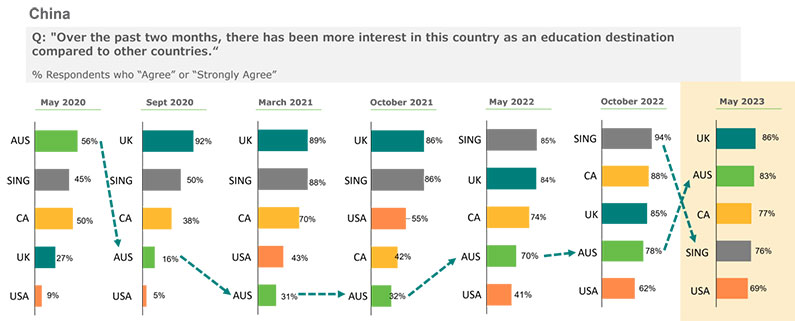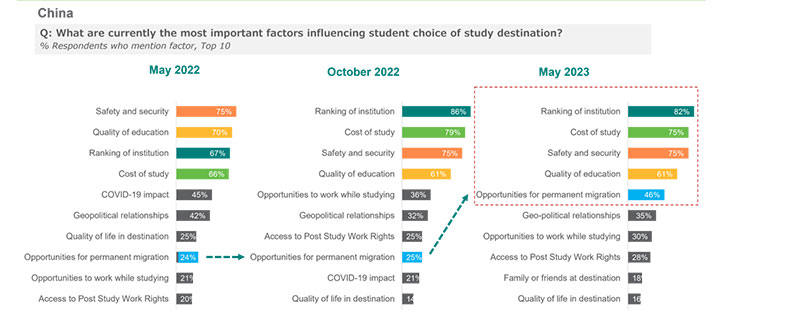China’s evolving preferences for study destinations: economic headwinds could be driving an increased interest in migration opportunities

Australia is back on the radar as an appealing destination for Chinese students, with a significant rise in interest in an education ‘down under’ recorded in the latest round of the Navitas Agent Perceptions Survey.
The biannual survey conducted in May canvassed almost 1000 agents across Navitas’ global network to provide a snapshot of the international education landscape.
Now in its seventh iteration, the survey revealed that Australia has leapt into the top two of preferred destinations for Chinese students, with only the United Kingdom holding more appeal.
From September 2000 to October 2022, Australia consistently ranked in fourth or fifth below Singapore, the United Kingdom, Canada and the United States, a position attributed to extended border closures in the midst of the global COVID-19 pandemic.

Now, with the world putting the pandemic in the rear-view mirror, the attraction to Australia is renewed as it enjoys a reputation as a safe and hospitable country with significant lifestyle benefits and high-quality education options.
Kim Eklund, General Manager – China, is based in Shanghai, one of the most heavily populated metropolitan centres in the world. He said rising levels of interest in Australia amongst Chinese students could be attributed to a host of shifting economic factors in their home nation.
“China is the world’s second largest economy and a major player when it comes to global growth, but in recent times we’ve seen a slowdown in economic activity,” he said.
In contrast, Australia and the United Kingdom are enjoying record low unemployment rates at 3.7% and 3.9% respectively (OECD 2023).
“In the last few years trade conflict with the United States, environment and energy constraints, three years of zero COVID policies, and regulatory reforms in the technology and education sectors have all influenced China’s employment market and overall economic health.
“What we are observing on the ground is the youth of China are now increasingly open to exploring alternative education and employment opportunities than those offered domestically.”
Mr. Eklund’s assessment was reflected in the survey, with agents indicating that ‘Opportunities for permanent migration’ was now one of the top five reasons given by students considering education pathways in Australia.

“Typically, China has not been thought of as a migration market,” Mr. Eklund said.
“Past surveys have illustrated that a pathway to residency has not been a priority for Chinese students compared to students from other regions such as South Asia and Africa, but that sentiment appears to be shifting in a surprising new direction.”
“With youth unemployment on the rise and a sense of disillusionment with career prospects at home, Chinese students are being drawn to the lifestyle and employment opportunities in Australia.
“In light of all that, the possibility of permanent migration is of growing importance as they consider their long-term futures.”
The other priorities listed in the top five for Chinese students considering a study destination included the ranking of the institution, cost of living, safety and security, and quality of education.